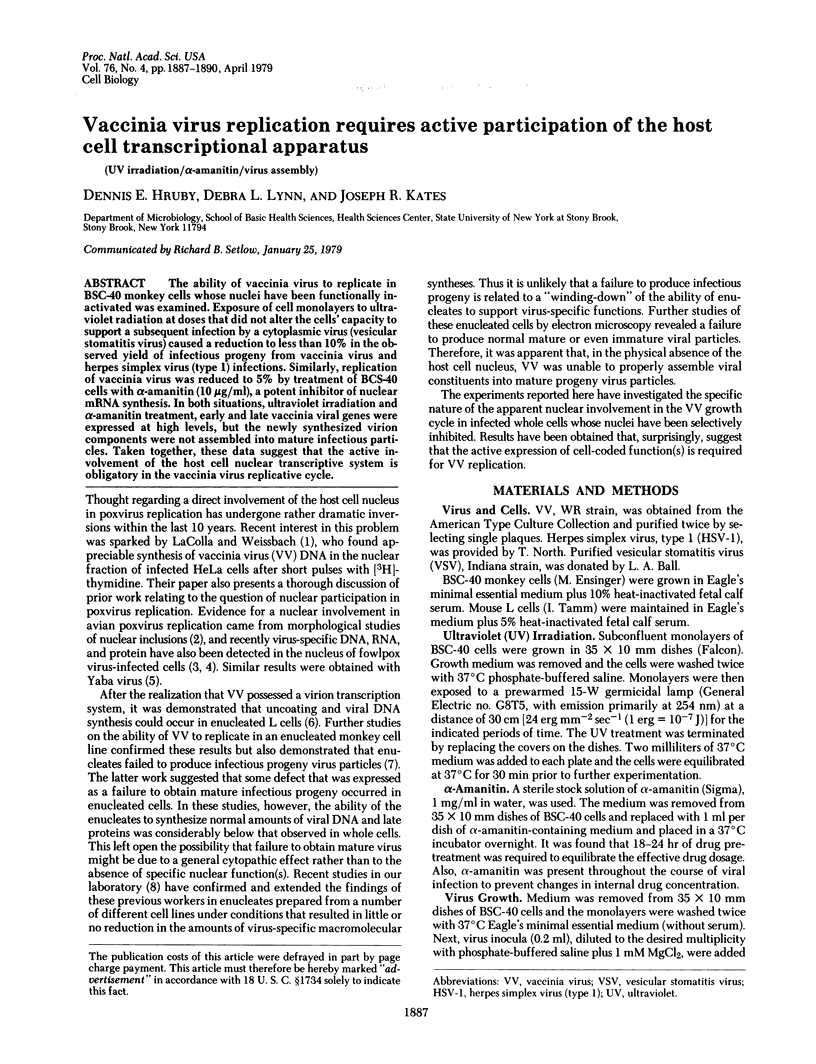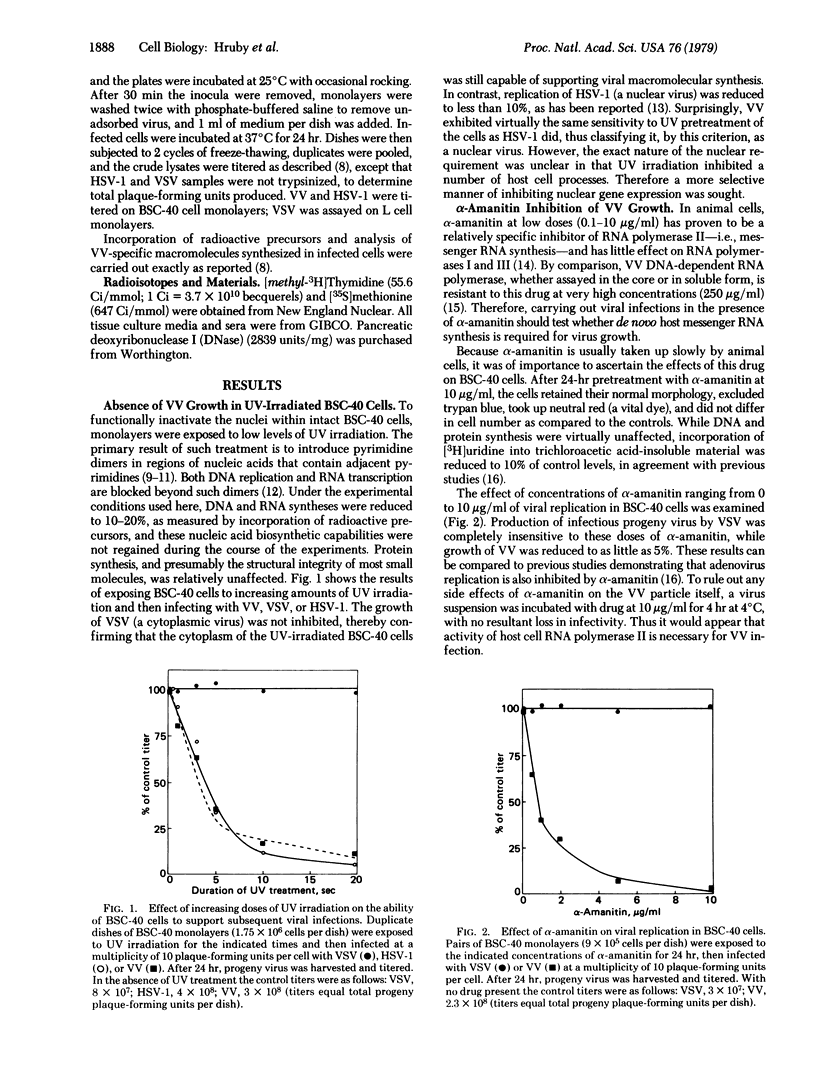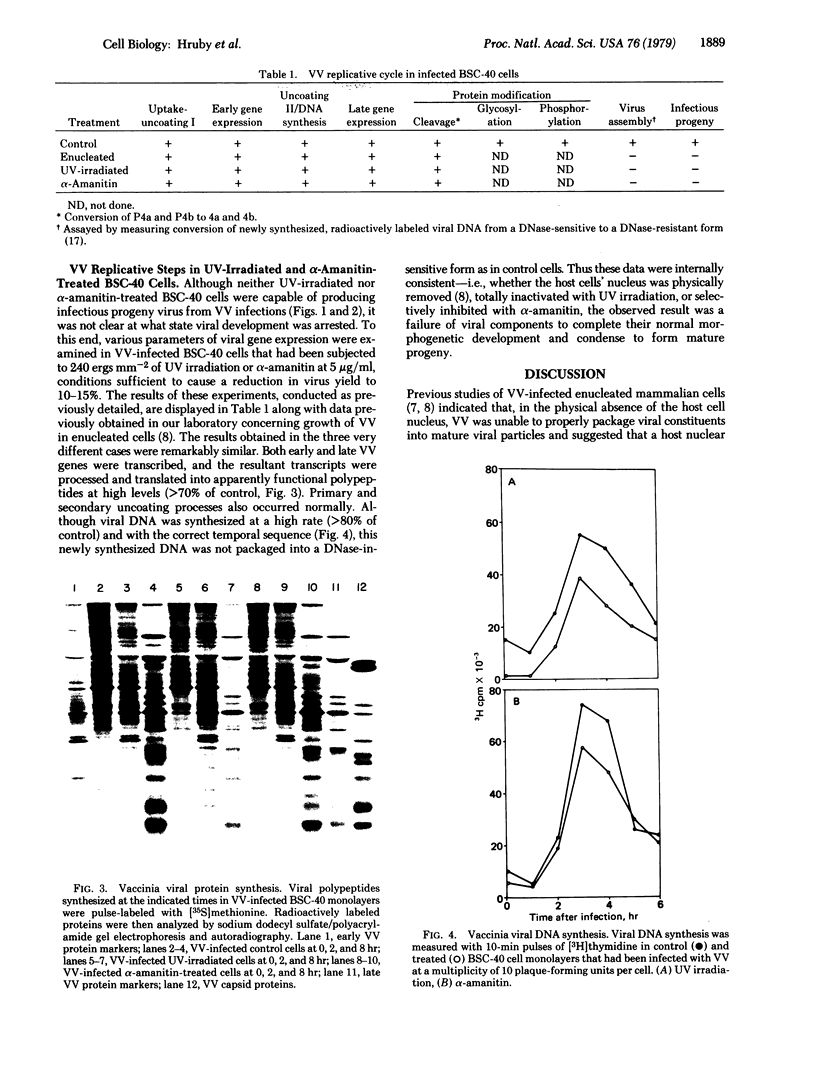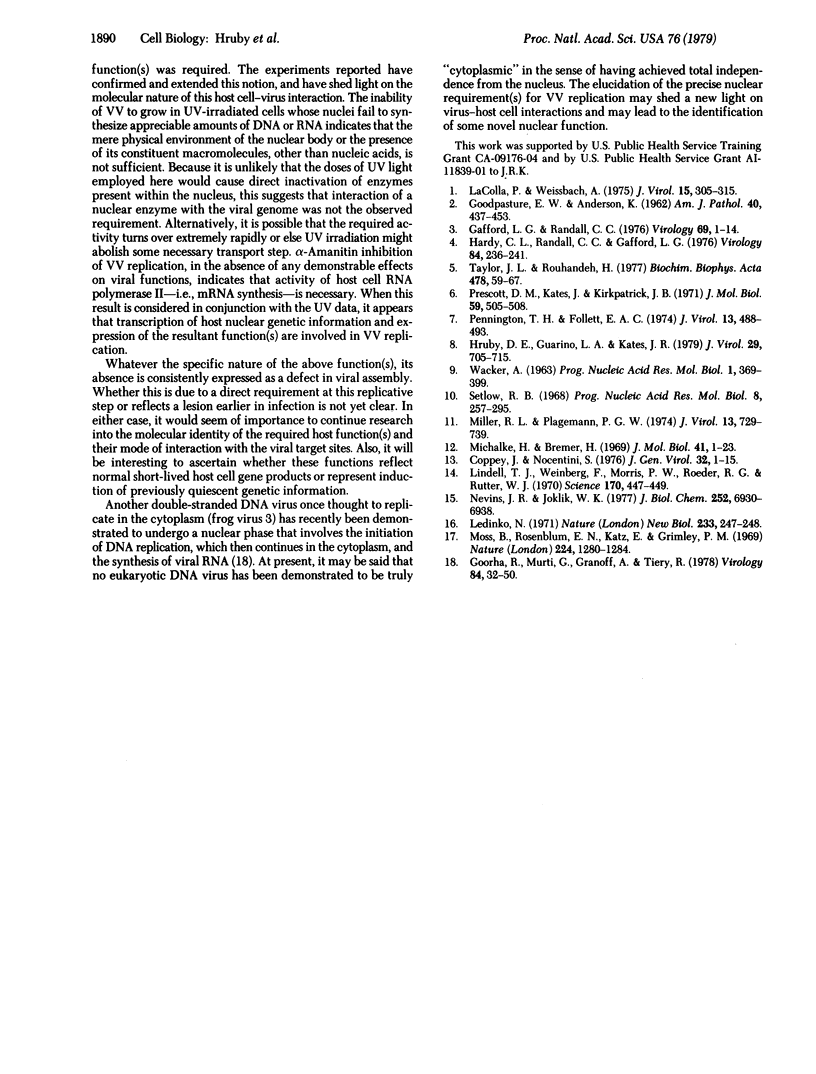Abstract
The ability of vaccinia virus to replicate in BSC-40 monkey cells whose nuclei have been functionally inactivated was examined. Exposure of cell monolayers to ultraviolet radiation at doses that did not alter the cells' capacity to support a subsequent infection by a cytoplasmic virus (vesicular stomatitis virus) caused a reduction to less than 10% in the observed yield of infectious progeny from vaccinia virus and herpes simplex virus (type 1) infections. Similarly, replication of vaccinia virus was reduced to 5% by treatment of BCS-40 cells with alpha-amanitin (10 microgram/ml), a potent inhibitor of nuclear mRNA synthesis. In both situations, ultraviolet irradiation and alpha-amanitin treatment, early and late vaccinia viral genes were expressed at high levels, but the newly synthesized virion components were not assembled into mature infectious particles. Taken together, these data suggest that the active involvement of the host cell nuclear transcriptive system is obligatory in the vaccinia virus replicative cycle.
Full text
PDF



Images in this article
Selected References
These references are in PubMed. This may not be the complete list of references from this article.
- Coppey J., Nocentini S. Herpes virus and viral DNA synthesis in ultraviolet light-irradiated cells. J Gen Virol. 1976 Jul;32(1):1–15. doi: 10.1099/0022-1317-32-1-1. [DOI] [PubMed] [Google Scholar]
- GOODPASTURE E. W., ANDERSON K. Isolation of a wild avian pox virus inducing both cytoplasmic and nuclear inclusions. Am J Pathol. 1962 Apr;40:437–453. [PMC free article] [PubMed] [Google Scholar]
- Gafford L. G., Randall C. C. Virus-specific RNA and DNA in nuclei of cells infected with fowlpox virus. Virology. 1976 Jan;69(1):1–14. doi: 10.1016/0042-6822(76)90189-6. [DOI] [PubMed] [Google Scholar]
- Goorha R., Murti G., Granoff A., Tirey R. Macromolecular synthesis in cells infected by frog virus 3. VIII. The nucleus is a site of frog virus 3 DNA and RNA synthesis. Virology. 1978 Jan;84(1):32–50. doi: 10.1016/0042-6822(78)90216-7. [DOI] [PubMed] [Google Scholar]
- Hardy C. L., Randall C. C., Gafford L. G. A viral-induced protein in the nuclei of cells infected with fowlpox virus. Virology. 1978 Jan;84(1):236–241. doi: 10.1016/0042-6822(78)90242-8. [DOI] [PubMed] [Google Scholar]
- Hruby D. E., Guarino L. A., Kates J. R. Vaccinia virus replication. I. Requirement for the host-cell nucleus. J Virol. 1979 Feb;29(2):705–715. doi: 10.1128/jvi.29.2.705-715.1979. [DOI] [PMC free article] [PubMed] [Google Scholar]
- LaColla P., Weissbach A. Vaccinia virus infection of HeLa cells. I. Synthesis of vaccinia DNA in host cell nuclei. J Virol. 1975 Feb;15(2):305–315. doi: 10.1128/jvi.15.2.305-315.1975. [DOI] [PMC free article] [PubMed] [Google Scholar]
- Lindell T. J., Weinberg F., Morris P. W., Roeder R. G., Rutter W. J. Specific inhibition of nuclear RNA polymerase II by alpha-amanitin. Science. 1970 Oct 23;170(3956):447–449. doi: 10.1126/science.170.3956.447. [DOI] [PubMed] [Google Scholar]
- Michalke H., Bremer H. RNA synthesis in Escherichia coli after irradiation with ultraviolet light. J Mol Biol. 1969 Apr 14;41(1):1–23. doi: 10.1016/0022-2836(69)90122-3. [DOI] [PubMed] [Google Scholar]
- Miller R. L., Plagemann P. G. Effect of ultraviolet light on mengovirus: formation of uracil dimers, instability and degradation of capsid, and covalent linkage of protein to viral RNA. J Virol. 1974 Mar;13(3):729–739. doi: 10.1128/jvi.13.3.729-739.1974. [DOI] [PMC free article] [PubMed] [Google Scholar]
- Moss B., Rosenblum E. N., Katz E., Grimley P. M. Rifampicin: a specific inhibitor of vaccinia virus assembly. Nature. 1969 Dec 27;224(5226):1280–1284. doi: 10.1038/2241280a0. [DOI] [PubMed] [Google Scholar]
- Nevins J. R., Joklik W. K. Isolation and properties of the vaccinia virus DNA-dependent RNA polymerase. J Biol Chem. 1977 Oct 10;252(19):6930–6938. [PubMed] [Google Scholar]
- Pennington T. H., Follett E. A. Vaccinia virus replication in enucleate BSC-1 cells: particle production and synthesis of viral DNA and proteins. J Virol. 1974 Feb;13(2):488–493. doi: 10.1128/jvi.13.2.488-493.1974. [DOI] [PMC free article] [PubMed] [Google Scholar]
- Prescott D. M., Kates J., Kirkpatrick J. B. Replication of vaccinia virus DNA in enucleated L-cells. J Mol Biol. 1971 Aug 14;59(3):505–508. doi: 10.1016/0022-2836(71)90313-5. [DOI] [PubMed] [Google Scholar]
- Setlow R. B. The photochemistry, photobiology, and repair of polynucleotides. Prog Nucleic Acid Res Mol Biol. 1968;8:257–295. doi: 10.1016/s0079-6603(08)60548-6. [DOI] [PubMed] [Google Scholar]
- Taylor J. L., Rouhandeh H. Yaba virus-specific DNA in the host cell nucleus. Biochim Biophys Acta. 1977 Sep 6;478(1):59–67. doi: 10.1016/0005-2787(77)90243-x. [DOI] [PubMed] [Google Scholar]



